#the affluence was so obvious it was almost uncomfortable
Text
nothing like leaving your bubble and going to a place where the median household income exceeds that of your hometown on the order of thousands to make you realize that you. are very much out of place
#it was a young musicians orchestra performance on a college campus#my god was that campus beautiful. what the hell#i felt so out of place in it#give me back the don giovanni set arts building any day#but it was striking to me through that whole performance like#the affluence was so obvious it was almost uncomfortable#and i mean my thoughts prob aren’t the clearest bc 11pm but whatever#and i know it’s like come on em you picked the Historically Inaccessible Interest. you picked the Stereotypically Affluent Interest#like why should this be striking#and i know why. because i have always felt so keenly that there was a place for me in western classical music#because people who easily fit into that world welcomed me with open arms and gave me a space#but sitting there today made me think. we are not so very different. except i could never imagine this being my after school activity#(i’m not even counting my first group. it was never this well oiled and organized.)#anyway. yeah idk what i was going for here. i feel odd
6 notes
·
View notes
Text
Treat Your S(h)elf: Tribe: On Homecoming and Belonging by Sebastian Junger (2016)
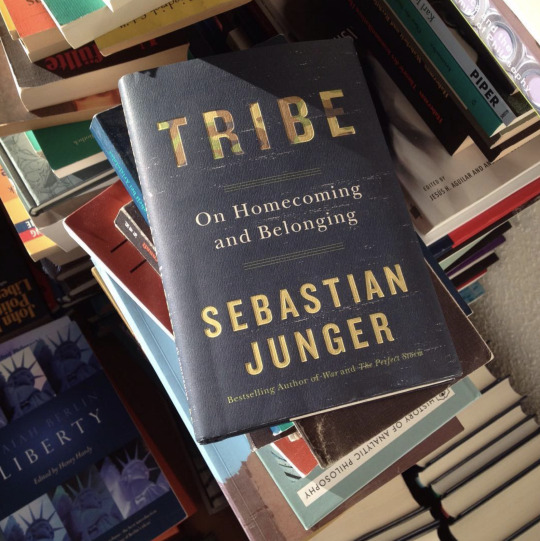
“Humans don’t mind hardship, in fact they thrive on it; what they mind is not feeling necessary. Modern society has perfected the art of making people not feel necessary. It's time for that to end.”
- Sebastian Junger, Tribe: On Homecoming and Belonging
The phenomenon of tribal solidarity is the subject of Sebastian Junger’s enthralling book, Tribe: On Homecoming and Belonging. Junger offers a rich but unevenly researched patchwork of history, psychology, and anthropology to explore the deep appeal of the tribal culture throughout history. The result is less of a tour de force book that I would have expected from the likes of Sebastian Junger than an interesting and thought provoking read. Certainly it should be read by anyone interested in the human condition.
As a British ex-military veteran and a fan of Junger’s other books I naturally found it fascinating.The memory of my most recent tour in Afghanistan was still raw upon my return to Britain. Although the book really focuses on returning American army servicemen and their integration back into the American ‘tribe’ there were several themes that I and many others who had seen war could readily identify with.

“Tribe” is not a typical Junger book. He doesn’t tell one knockout story, as he did in the “The Perfect Storm,” which made him rich and famous, or as he did in “War,” which — along with his documentaries “Restrepo” and “Korengal” — established him as one of the world’s most mesmerising chroniclers of the Afghanistan war. Rather, he gives us an extended-play version of an article he wrote for for Vanity Fair — one that’s part ethnography, part history, part social science primer, part cri de coeur. Junger previously served as a war correspondent for Vanity Fair, embedding for long stretches at remote American outposts in Afghanistan’s frightful Korengal valley. This experience may help explain his interest in the intimate bonds that define tribal societies as well as the despair that can come from being wrenched out of a situation that makes those bonds necessary.
Junger’s premise is simple: Modern civilisation may be awesome, giving us unimaginable autonomy and material bounty. But it has also deprived us of the psychologically invaluable sense of community and interdependence that we hominids enjoyed for millions of years. It is only during moments of great adversity that we come together and enjoy that kind of fellowship — which may explain why, paradoxically, we thrive during those moments. (In the six months after Sept. 11, Junger writes, the murder rate in New York dropped by 40 percent, and the suicide rate by 20 percent.)
“I do miss something from the war,” Bosnian journalist Nidzara Ahmetasevic tells Sebastian Junger halfway through the book. Ahmetasevic is talking about the wartime closeness she shared with friends in a basement bomb shelter in besieged Sarajevo. “The love that we shared was enormous,” Ahmetasevic says. “I missed being close to people, I missed being loved in that way.”
The sentiment lies at the heart of Tribe, a book offering a surprising thesis about the ways humans have traded communal belonging for excessive safety.
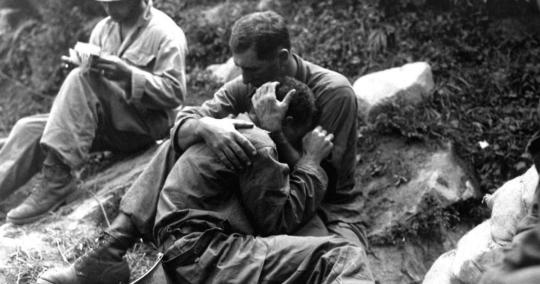
Junger gets a considerable amount done in a quick 133 pages: Tribe posits a reason why white settlers found life among Native American tribes appealing, theorises about false PTSD claims among returned U.S. veterans, and conveys the author’s equality-minded view of how heroic behaviour varies between genders — all in addition to remarks on hitchhiking, attachment parenting, Junger’s dad’s opinion of military service, and more. It’s an awful lot of ground to cover in such a short book, and it’s inevitable that Tribe would either feel inchoate and sketched or else aggravatingly dense. Because Junger is an adventurous storyteller (rather than, say, an academic theoretician), he opts for the former.
It’s not necessarily a good thing. The book’s lightness makes it accessible, an easy entry point to weighty subject matter. But its concision can make Tribe feel breezy even as it discusses life and death — if not sometimes confusing.
As a former anthropology major, Mr. Junger takes a special interest in tribal life. He notes that a striking number of American colonists ran off to join Native American societies, but the reverse was almost never true. He describes the structure and values of hunter-gatherer groups, including the ones that lasted well into the 20th century, like the !Kung in the Kalahari.
Unfortunately, these parts of the book are also the dullest and most problematic. There’s a numbingly familiar quality to much of the social science research he cites. It is not exactly news that nations with large income disparities are less happy than those without them, or that group cooperation increases levels of oxytocin, the bonding hormone. He notes, for example, that American mothers in the 1970s had a level of skin-to-skin contact with their babies that traditional societies would consider criminally low. Fair enough. I wonder, though, if he realises that in saying this he’s crashing open the gate for every helicopter parenting (or attachment-parenting) demagogue out there? And that parents who actually have to go to work for a living - and therefore can’t have their babies pinned to their chests all day long for three years straight - will read these words and start rolling the eyes back in disbelief.

Though Junger cautions against romanticising tribal cultures, he sometimes does exactly that, and in ways that can be annoying. Tribe aptly opens with Benjamin Franklin’s observation, decades before the American Revolution, that more than a few English settlers were “escaping into the woods” to join Indian society. Franklin noticed that emigration seemed to go from the civilised to the tribal, but rarely the other way around. White captives of the American Indians, for instance, often did not wish to be repatriated to colonial society. At this distance, it is simply astonishing that so many frontiersmen would have cast off the relative comforts of civilisation in favour an “empire wilderness” rife with Stone Age tribes that, as Junger notes, “had barely changed in 15,000 years.”
The small but significant flow of white men — they were mostly men — into the tree-line sat uncomfortably with those who stayed behind. Without indulging the modern temptation to romanticise what was a blood-soaked way of life, Junger hazards an explanation for the appeal of tribal culture. Western society was a diverse and dynamic but deeply alienating place. (Plus ça change…) This stood in stark contrast to native life, which was essentially classless and egalitarian. The “intensely communal nature of an Indian tribe” provided a high degree of autonomy — as long as it didn’t threaten the defence of the tribe, which was punishable by death — as well as a sense of belonging. Tribe is then essentially a critique of modern civilisation, beginning with Junger’s observation of the inexorable appeal of Native American way of life to early settlers (“The intensely communal nature of an Indian tribe held an appeal that the material benefits of Western civilisation couldn’t necessary compete with”).
“The question for Western society isn’t so much why tribal life might be so appealing - it seems obvious on the face of it - but why Western society is so unappealing.” Junger is making a provocative point, but he is no provocateur. He swiftly justifies this jarring idea:
On a material level it is clearly more comfortable and protected from the hardships of the natural world. But as societies become more affluent they tend to require more, rather than less, time and commitment by the individual, and it’s possible that many people feel that affluence and safety simply aren’t a good trade for freedom.

All of these points have been covered in other, heavier books. Jared Diamond’s The World Until Yesterday examines traditional tribal lifestyles’ usefulness in the present day. The entanglement of war with human closeness and purpose is the focus of Chris Hedges’s War Is a Force That Gives Us Meaning. (Both Hedges and Junger include the same anecdote, in fact, about a teenage couple in besieged Sarajevo, that dies, sniper-shot, on the banks of the Miljacka River.) Junger also briefly mentions the work of seminal disaster researcher Charles Fritz, noting that Fritz could find almost no examples of mass panic during large-scale disasters. This plays into his overarching point that difficult experiences can be unifying rather than shattering. The exact same studies by Fritz and fellow researchers — and that exact same, crucial point — are detailed in Rebecca Solnit’s brilliant A Paradise Built in Hell.
Junger uses these insights towards another point. “Because modern society has almost completely eliminated trauma and violence from everyday life, anyone who does suffer these things is deemed to be extraordinarily unfortunate,” he writes. “This gives people access to sympathy and resources but also creates an identity of victimhood that can delay recovery.” This is an important observation. It, too, resonates quite closely with previous work - in this case Harvard psychiatrist Judith Lewis Herman’s seminal book Trauma and Recovery, which remarks that “to hold traumatic reality in consciousness requires a social context that affirms and protects the victim and that joins victim and witness in a common alliance.”
At best what Junger tries to achieve, then, is to assemble parts of all those books into one slim volume. So much the better for the busy reader. Unfortunately, Junger’s quick look at violence, trauma, and modern anomie also omits important information from other books, and as a result ends up on shaky ground, failing to consider counterpoints or bring its own arguments to a close.

Junger in the second half of the book proceeds through an examination of how disastrous or violent circumstances can create similar human closeness, and includes a discussion of how our society’s distancing itself from such harsh conditions has inadvertently sharpened those events’ capacity to traumatise the people who endure them.
War is hell, so this scourge of loneliness may seem the inevitable price for those who fight in them. The second half of Tribe insists that this impression is gravely mistaken. “Studies from around the world show that recovery from war is heavily influenced by the society one belongs to,” Junger observes. Iroquois warriors, for instance, did not have to contend with much alienation because the line between warfare and normal Indian society was vanishingly thin. This is not to deny that the Iroquois were traumatised by combat, but it was generally acute PTSD, limited in duration and distress. Their trauma was ameliorated by the fact that the trauma was shared by the entire tribe.
War, then, for all of its brutality and ugliness, satisfies some of our deepest evolutionary yearnings for connectedness. Platoons are like tribes. They give soldiers a chance to demonstrate their valour and loyalty, to work cooperatively, to show utter selflessness.
Is it any wonder that so many of them say they miss the action when they come home?

Part of the takeaway from this book is that regarding military service as a source of permanent psychiatric disability is incorrect for most (American) soldiers. Junger includes a lengthy discussion of how the U.S. Veterans Administration mishandles former soldiers’ mental health issues, and how America’s cultural misunderstanding of war plays into that deleterious milieu. The information isn’t wrong per se, but what it has to do with the rest of the romanticising of foregone tribal way of life, etc., or why that necessitates anything more than the 2015 Vanity Fair article from which the book sprung is never quite made clear. Worse, Junger says that the low rate of combat engagement among U.S. soldiers means their diagnoses of post-traumatic stress disorder often aren’t real - but he fails to consider that some soldiers develop PTSD from military sexual trauma, or from other adverse experiences outside of combat or before their enlistment.
Worse, he seems to misunderstand the diagnosis entirely. Here, as in the Vanity Fair article, Junger describes his own bout with what he calls “classic short-term PTSD,” departing from this insight to further dissect trauma and the ways modern society misunderstands it. The problem is, there really is no such thing as “short-term PTSD.” It sounds like what Junger had was post-traumatic stress, a weeks - or months - long psychological adaptation to adverse events (in his case, exposure to war) that typically resolves on its own.

Although psychological care can sometimes be relevant, most mental health professionals don’t regard this as an illness. (Tellingly, Junger’s approach to his diagnosis involved little more than an acquaintance’s ad hoc comment at “a family picnic.”) Post-traumatic stress disorder is only diagnosable after three to six months, does not often go away on its own, and can endure for a lifetime if untreated. The implication that Junger’s case is typical PTSD is misleading - and to some extent, calls his conclusions into question.
The problems in his argument go even deeper. “In Bosnia — as it is now — we don’t trust each other anymore; we became really bad people,” Ahmetasevic tells Junger. “We didn’t learn the lesson of the war, which is how important it is to share everything you have with human beings close to you.” Junger’s thesis is that other cultures (the “Stone-Age tribes” white settlers once joined) did learn that lesson. But he assumes that violence is innate to humans and necessary for human closeness, never parsing evidence that it is not. And he doesn’t examine what this Bosnian journalist means by “really bad,” and how becoming so after the war might have arisen directly from the painful, long-lasting effects of the severe trauma Junger doesn’t quite seem to believe in.
If there is any doubt on this point, consider the alarming rates of PTSD among our warrior class, and the desire among many of them to return to war — a subject on which Junger has been at the leading edge of the public discussion. When combat vets return home, the alienation and aimlessness of modern society aggravates their psychological traumas and prompts them to yearn for the brotherhood of combat. It’s not for nothing that a recent book on post-traumatic stress is entitled The Evil Hours.

Many soldiers actually miss war. “Adversity,” he writes, “often leads people to depend more on one another, and that closeness can produce a kind of nostalgia for the hard times.” Soldiers go from a close-knit group in which everyone has a purpose to a society in highly individualised lifestyles are “deeply brutalising to the human spirit.” Soldiers who come home to situations in which there is no social support from family and community are more likely to suffer PTSD than others.
Thanking veterans for their service aggravates the problem, in Junger’s opinion. “If anything, these token acts only deepen the chasm between the military and the civilian population by highlighting the fact that some people serve their country but the vast majority don’t.” Tickets to games and other such perquisites can incentivise veterans to see themselves as victims, making their reintegration into society much more difficult.
What they really need is the one thing that will make them feel like valuable members of society: jobs. In their tribe-like military units, they each had a specific function without which the group could not perform. The worst thing that can happen to them when they return is to feel useless, marginalised. The suicide rate in America mirrors the unemployment rate, Junger points out. The best protection against devastating depression is meaningful work.
“Ex-combatants shouldn’t be seen - or be encouraged to see themselves - as victims,” writes Junger. Lifelong disability payments for PTSD, which is treatable and usually not chronic, actually debilitate veterans, Junger claims. In war, the passivity of victimhood can be deadly, he explains. Turning veterans into victims when they return is not only confusing but also destructive because it erases their sense of self. Instead of sympathy, “veterans need to feel that they’re just as necessary and productive back in society as they were on the battlefield.”
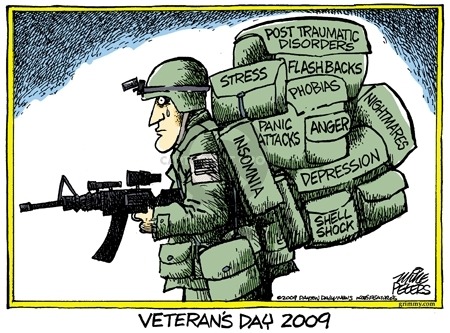
Of course much of this book is really around the American experience of war and the experiences of American veterans returning home. So some points don’t quite stick with either British or European experiences. For example neither British or other European societies thank veterans for their service as a matter of course. Of course there are special days to commemorate major war events and even an armed forces day but on a general day to day basis one doesn’t go up to a military person to thank them for their service probably because British and European servicemen and their service don’t enjoy a privileged standing. Respected and admired yes, but not deified. How British and other European countries take care of their returning veterans is hard to detail as the experience varies in terms of disability allowances and other measures. Certainly a misunderstanding of mental trauma or PTSD of returning veterans has led sometimes to a criminal mismanaging of taking care of those most affected. Again, it varies from country to country.
Contemporary America is a considerably less consolidated society than it used to be. Cultural diffusion and economic stratification have increased the isolation felt by those who have borne the heat and burden of battle. I won’t a forget photograph shown to me by an older brother who had served with distinction in Iraq. He made a few American friends from the US soldiers serving there alongside and one day he was shown something that captured the dark humour and cynicism of war. The photo captured a graffito scribbled on a wall in Ramadi, Iraq, that read: “America is not at war. The Marine Corps is at war. America is at the mall.”
Multiple studies demonstrate that “a person’s chance of getting chronic PTSD is in great part a function of their experiences before going to war.” The relationship between combat and trauma seems to be a murky one. For instance, “combat veterans are, statistically, no more likely to kill themselves than veterans who were never under fire.” Junger says that even a significant number of Peace Corps volunteers report suffering severe depression after their return home, especially if their host country was in a state of emergency when they did. In Junger’s telling, particular burdens endured by socially disadvantaged Americans - from a poor educational background to chaotic broken family life - can make a candidate especially susceptible to PTSD. Indeed, these risk factors “are nearly as predictive of PTSD as the severity of the trauma itself.”
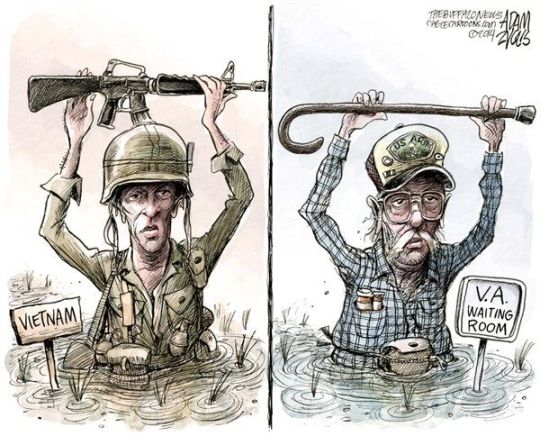
The decline of social order and solidarity has contributed to a loss of what researchers call “social resilience.” This has simultaneously supplied more potential candidates for PTSD and impaired society’s ability to help them recover. The United States must place a premium on boosting its levels of social resilience. Americans should no longer be content to simply thank veterans for their service; sporting events are not places of healing. Nor should they seek to outsource the responsibility to the federal government. The solution lies closer to home, in the mediating institutions of civil society — from families to churches to community and professional associations. I think this echoes the views of quite a few veterans in my experience with them.
More sensitively and perhaps controversially, ex-combatants shouldn’t be regarded, or encouraged to regard themselves, as victims. This I also agree with. America is still a tremendously affluent country, Junger writes, that can afford to perpetually care for a victim class of veterans dependent on government largesse, “but the vets can’t.” They have generally performed exemplary service for which they should be honoured, and they must know that their service is not over.
Next, Junger says, veterans (like most social animals) depend upon a sense of purpose that begins with a job and a position in society. Here the “hire vets” initiatives and retraining programs are necessary but insufficient. The traditional means of securing social resilience has been egalitarian social provision. Individualist America may blanch at that notion, but it should at least act to build a more open economy and inclusive culture where individuals can reliably advance by merit and develop social capital.

Not being an American I don’t wish to speak out of turn but as a veteran and especially in speaking with other British and foreign veterans I think Junger is on the right path. Victimhood and a lack of purpose are the unseen enemy that the returning veteran will continue to fight when he or she comes home.
To all this I would also that - arguably perhaps in America especially - a revival of national cohesion is needed if - as a nation that pays lip service to honour the sacrifices of its servicemen - it is to arrest the full savagery of battlefield trauma. This will require what Edmund Burke called “a revolution in sentiments, manners and moral opinions.”
One clue about how to achieve this can be found in the early pages of Tribe, when Junger tells an affecting anecdote about his father. Not long after the end of the Vietnam War, the author had received a Selective Service registration form in the mail, in case the United States government ever needed to conscript him into the military. When he announced that, if drafted, he would refuse to serve on political grounds, his father’s reaction caught him off guard. Although sternly opposed to the war in Indo-China, Junger’s father insisted that American soldiers had “saved the world” from fascism during World War II and many never came home. Junger writes;
“‘You don’t owe your country nothing,’ I remember him telling me. ‘You owe it something, and depending on what happens, you might owe it your life.’” This did not oblige anyone to enlist in an unjust war - “in his opinion, protesting an immoral war was just as honorable and necessary as fighting a moral one” - but it did mean that the country had just claims on its citizens, and refusing to sign a registration form constituted a dereliction of duty.

Year after year, Americans hear arguments for taking the stink out of their sulphurous political rhetoric. It would be better for congressional productivity. It would be better for our international dignity. It would be better for their national literacy, their local advocacy, their general civility and the future etiquette of their children. But the one argument I had not heard, until reading Junger’s book is that they should clean up their act for the sake of their returning troops.
Junger never makes this point explicitly. What he writes, simply, is this: After months of combat, during which “soldiers all but ignore differences of race, religion and politics within their platoon,” they return to the United States to find “a society that is basically at war with itself. People speak with incredible contempt about - depending on their views - the rich, the poor, the educated, the foreign-born, the president or the entire U.S. government.” Soldiers go from a world in which they’re united, interconnected and indispensable to one in which they’re isolated, without purpose, and bombarded with images of politicians and civilians screaming at one another on TV and cable.
It’s a formula for deep despair. “Today’s veterans often come home to find that, although they’re willing to die for their country,” he writes, “they’re not sure how to live for it.”
With that, Mr. Junger has raised one of the most provocative ideas for bitterly divided Americans to grapple with without mentioning a single political candidate, or even a president, by name.
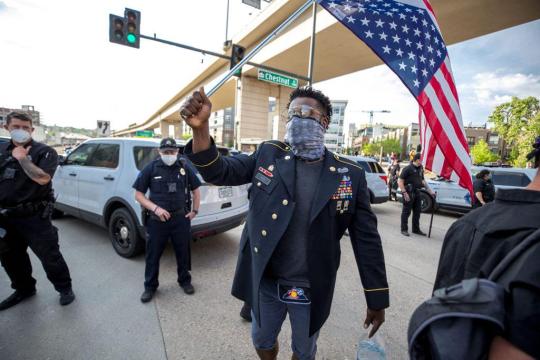
In this age of social and economic fragmentation, many of America’s disadvantaged fellow citizens have begun to chafe against an elite class - left and right - that often behaves as if it were exempted from the national compact. Junger only hints at the necessary leap beyond a social-psychological view to a political-economic analysis. He writes, "As great a sacrifice as soldiers make, American workers arguably make a greater one…. [w]orking in industries that have a mortality rate equivalent to most units in the US military." He suggests, "It may be worth considering whether middle-class American life - for all its material good fortune - has lost some essential sense of unity that might otherwise discourage alienated men from turning apocalyptically violent."
Nobody then should be surprised if the ranks of disaffected citizens – not least those who have borne arms in our name and in their defence - ultimately decide that the sensibility of the tribe is superior to their own.
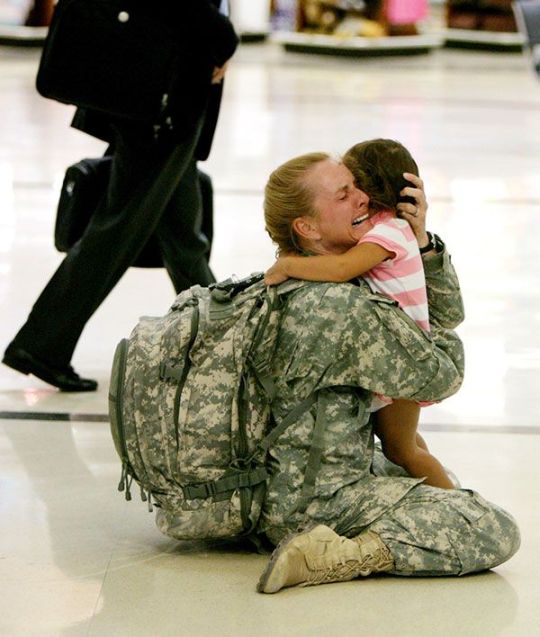
As a proud Brit who is guilty at times of poking fun at America but borne out of sincere fondness and respect for America I do sincerely hope during these turbulent times that they are capable of coming together and recognising their tribal identity is to be Americans first and other labels (liberal or conservative or red state or blue state) whilst not inconsequential are not important enough to undermine the primary American tribal identity. They did it so marvellously after 9/11, but that feeling as we all know soon dissipated. It can’t afford to be a house divided from within when there are predatory wolves pawing at the door (I’m looking at you Russia and China). Junger correctly writes America is a strong nation, “The only one who can destroy us, is, well, us…..which means that the ultimate terrorist strategy would be to just leave us alone.”
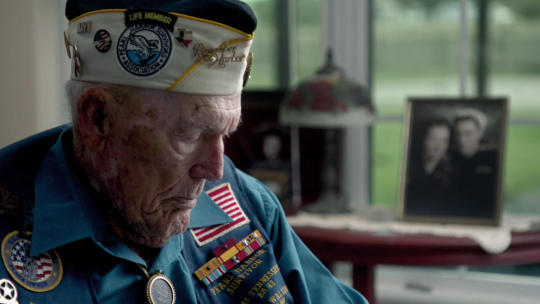
Tribe is an important, thought-provoking book that encourages Americans to see its veterans and American society in a fresh light. Policymakers of all political stripes would do well to consider Junger’s arguments, for as long as they fail to fully integrate returning soldiers, everyone will continue to pay a high toll for their incredible service and sacrifice.
Junger’s “Tribe” even if it was written in 2016, remains relevant and serves as an important wake-up call. Let’s hope we all don’t sleep through the alarm. But this too brief and too scattershot book with an important message won’t get us all the way there. There is an old South African Zulu proverb, ‘If you want to go fast, go on your own. If you want to go further, go together’. It’s up to all of us.
#treat your s(h)elf#book review#books#reading#sebastian junger#junger#tribe#war#battle#america#army#society#culture#anthropology#native indian#iroquoi#veterans#PTSD#integration#civilisation#state
196 notes
·
View notes